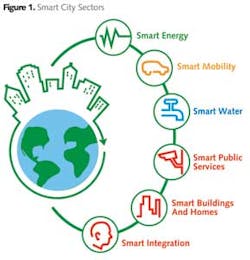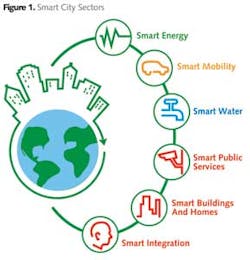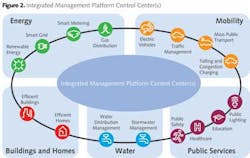Smart Water: A Key Building Block of the Smart City of the Future
By Mark Leinmiller and Melissa O'Mara
The World Health Organization reports that for the first time ever, the majority of the world's population lives in a city, and this proportion continues to grow with projections of 70 percent by 2050. Currently, around half of all urban dwellers live in cities with populations between 100,000 and 500,000 people, and almost 10 percent of urban dwellers live in megacities, which are defined by UN HABITAT as a city with a population of more than 10 million.
As cities around the world experience this exploding growth, the need to ensure they can expand sustainably, operate efficiently and maintain a high quality of life for residents becomes even greater than it is today. This is where smart cities come into the picture.
The term "smart cities" is trending amongst governments, urban planners and even the private sector to address the projected demands of cities in the future. Making cities smarter to support growth is emerging as a key area of focus for governments and the private sector alike. This decade, cities around the world will invest $108 billion in smart city infrastructure, such as smart meters and grids, energy-efficient buildings and data analytics, according to Navigant Research.
What is a Smart City, Exactly?
Smart cities encompass six important sectors that need to work in unison to achieve a common goal of making a city more livable, sustainable and efficient for its residents. These sectors are smart energy, smart integration, smart public services, smart mobility, smart buildings, and smart water.
Building smart cities upon the six sectors is crucial for sustainable global growth, but the financial, logistical and political challenges are enormous. The conversations about growth of smart cities have historically been dominated by large IT companies that focus on analyzing "big data" taking a top-down, software-centric approach. However, when it comes to the modernization of hundred-year-old systems like water distribution or the power grid, advanced software and networking capabilities are rarely broad enough in scope to make the necessary impact.
Conversely, a bottom-up approach to smart city development is based on the belief that the rapid migration to cities will tax municipal infrastructures beyond their breaking points. The cities that succeed in transitioning to "smart" operations will be those that improve their critical systems and infrastructure at a fundamental level as well as integrate their systems through advanced technology. Lastly, smart cities will apply advanced monitoring and analytics to continuously measure and improve performance.
Schneider Electric is working on more than 200 smart city projects around the world, taking this unique infrastructure-first approach, which includes:
- Setting the vision and roadmap for an efficient, livable and sustainable city
- Combining best-in-class hardware and software to improve operating systems
- Bringing in integration for city-wide operational and informational efficiency
- Adding innovation as a foundational element of planning and operations
- Driving collaboration between the most well-suited global and local players, as well as across the entire smart city value chain
Smart Cites, Smart Water
One of a city's most important pieces of critical infrastructure is its water system. With populations in cities growing, it is inevitable that water consumption will grow as well. The term "smart water" points to water and wastewater infrastructure that ensures this precious resource - and the energy used to transport it - is managed effectively. A smart water system is designed to gather meaningful and actionable data about the flow, pressure and distribution of a city's water. Further, it is critical that that the consumption and forecasting of water use is accurate.
A city's water distribution and management system must be sound and viable in the long term to maintain its growth and should be equipped with the capacity to be monitored and networked with other critical systems to obtain more sophisticated and granular information on how they are performing and affecting each other. Additional efficiencies are gained when departments are able to share relevant, actionable information. One example is that the watershed management team can automatically share stormwater modeling information which indicates probable flooding zones and times based on predictive precipitation intelligence. The transportation department can then reroute traffic accordingly and preemptively alert the population using mass notification.
Water systems are often overlooked yet are critical components of energy management in smart cities, typically comprising 50 percent of a city's total energy spend. Energy is the largest controllable cost in water/wastewater operations, yet optimizing treatment plants and distribution networks has often been overlooked as a source of freeing up operating funds by cash-strapped municipalities. Once facilities are optimized and designed to gather meaningful and actionable data, municipal leaders can make better and faster decisions about their operations, which can result in up to 30 percent energy savings and up to 15 percent reduction of water losses.
Water loss management is becoming increasingly important as supplies are stressed by population growth or water scarcity. Many regions are experiencing record droughts, and others are depleting aquifers faster than they are being replenished. Incorporating smart water technologies allows water providers to minimize non-revenue water (NRW) by finding leaks quickly and even predicatively using real-time SCADA data and comparing that to model network simulations. Reducing NRW also allows municipalities to recover costs incurred in treatment and pumping - this can be significant. A medium-sized city with 100 million gallons per day of produced water that loses 25 percent (not an unusual amount) is incurring over $13 million per year in non-recoverable labor, chemical and energy expenses.
On the wastewater side, there is a move by organizations such as the Water Environment Federation (WEF) to transform wastewater treatment plants into resource recovery facilities, which includes energy. There are several examples of facilities that now produce more energy than required for their operations and sell the excess energy back to the grid. While this is not practical for all treatment plants, it is a worthy ambition and can be facilitated utilizing WEF's Energy Roadmap.
Achieving a Smart Water Future
One of the biggest obstacles to any capital-intensive project is access to funding. As cities and municipalities look to achieve smarter water, there are a number of options available to help them get started. One very effective path is through leveraging energy-saving performance contracts (ESPCs).
ESPCs are a form of a public-private partnership (PPP or P3), a financial model that capitalizes on the flexibility and resources of the private sector to pay for energy-saving capital upgrades using future energy savings. The initial investment is provided by the private financial community, and services are delivered by energy service companies (ESCOs). The financier is paid from the accrued energy savings, with the ESCO guaranteeing the savings amount.
An ESPC starts with an energy audit. After identifying opportunities and quantifying the potential savings, the ESCO recommends any number of energy conservation measures, such as equipment retrofits, pumping optimization, demand monitoring and control, and/or load-shedding and cogeneration which will save energy through more efficient operations.
About the Authors: Mark Leinmiller is the Segment Manager for Schneider Electric's Water & Wastewater Competency Center. Melissa O'Mara is the chief catalyst of Smart Cities US at Schneider Electric.


